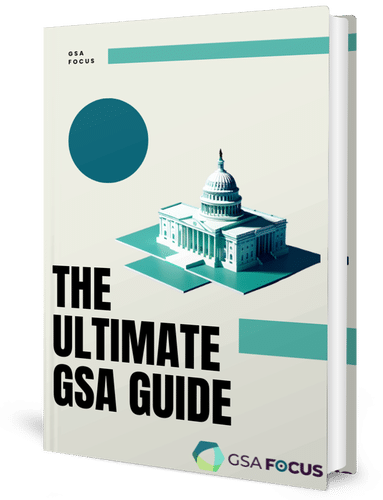One of the most popular forms of government business partnerships is the General Services Administration (GSA) Schedule contract. This Schedule contract is a long-term agreement between the federal government and private businesses. The need for these contracts spans many different industries, ensuring that most companies can find a home with a GSA contract.
It may be no surprise that pricing is an essential element that you must include in every GSA Schedule contract. However, due to the GSA’s specific and precise nature, such an important facet of your Schedule, it is important to know all pricing aspects. That way, you can ensure you get the type of Schedule the GSA is known to award.
This article will explain the essential things to know about GSA Pricing.
What is GSA Pricing?
Table of Contents
Toggle“GSA pricing” refers to a corporation’s agreement with the General Services Administration to provide goods and services to any qualified government agency or department.
Being awarded a GSA Schedule Contract can increase profits and purchases for a company in the long run.
GSA Pricing Rules
Here are five pricing guidelines that you should be familiar with:
1. Fair and Reasonable Pricing
A GSA Contracting Officer must determine if the pricing they are negotiating in place of the federal government is fair and reasonable. Rather than relying on the simpler FAR Subpart 8.4, GSA will use the more complex FAR Part 15 in making its decision to guarantee that prices are indeed fair and reasonable.
2. Price Increases
The pricing that gets included in your contract has been or will get based on one of the following provisions to manage price increases:
- 216-70 Economic Price Adjustment – Multiple Award Schedule Contracts
- I-FSS-969 Economic Price Adjustment – FSS Multiple Award Schedule paragraph (b)(1)
- I-FSS-969 Economic Price Adjustment – FSS Multiple Award Schedule paragraph (b)(2)
You may also request price hikes:
- When the commercial pricing list or market-rate sheet used as the basis for the award has gotten updated
- On or after the first 12 months of the contract
- Each subsequent 12-month period (up to three times)
- If it has been at least 30 days since your last increase
- The raise does not occur within 60 days of the contract’s end
If your request does not contradict the above directions, you will be permitted to seek a price increase of up to:
- 4% for the Human Capital Category
- 5% for the Professional Services Category
- 5% for the Travel Category
- 10% for All Other Large Categories for the Contract Period
3. Price Reductions
The FAR 552.238-81 Price Reductions requires a clause that allows you to establish a price-discount relationship with the government with a specific customer or group of customers, which will serve as the Basis of Award (BOA).
If the prices on your commercial price list or market-rate sheet go down or you give a better discount to your BOA, the price reductions clause gets prompted, and you have 15 calendar days to tell your Contracting Officer.
Notably, a price cut can be temporary or last for good.
4. Electronic Price List
GSAM 552.238-77 Submission and Distribution of Authorized Federal Supply Schedule (FSS) Price Lists requires that your negotiated pricing be published online in GSA Advantage within 30 days of award. Orders must get charged the Industrial Funding Fee and all other fees.
You must update your digital price list following price changes or at least once every two years. Not to mention, eBuy, GSA’s acquisition tool, can only be used if your pricing gets disclosed electronically.
5. Transactional Data Reporting (TDR)
GSA recently released a new service to help you figure out your GSA price. TDR (Transactional Data Reporting) necessitates more consistent sales reporting but allows a contractor more flexibility when discounting commercial customers and eliminates the need for a Most Favored Customer (MFC). A sales report should be filed at the end of each month, outlining all purchases made by government agencies and their prices.
With TDR, you do not need to provide any information regarding your commercial sales to the government. This strategy is ideal for organizations with an uneven discounting policy and a willingness to disclose sales slightly more frequently than normal.
Best Practices in GSA Pricing
To further your chances of succeeding with a GSA Contract, some best practices in negotiating fair and reasonable pricing.
Conduct Market Analysis
Contracting Officers (COs) should perform market research for all purchases to understand what pricing they might expect to pay and reasonable discounts.
Understanding the marketplace by looking at data on prices paid, current commercial pricing patterns, and other industry trends can assist COs in determining when more reductions are necessary. One possible source of this data is the Acquisition Gateway.
Enhance Competition
Another method the government might use its purchasing power to induce price reductions is to maximize competition. Purchasing operations should involve the industry early in the acquisition planning process to provide contractors with enough time to prepare for upcoming contests.
Even if the FAR does not require it, contracting activities are encouraged to post RFQs to eBuy to boost RFQ visibility and the community of interested contractors. Contractors may be more willing to provide discounts in a more competitive market.
Ask Questions
It is best to request a price discount in the first RFQ and after quotes have been received and analyzed when issuing a written RFQ. The RFQ should always request that contractors submit their best pricing, including all discounts, with their initial estimates.
COs should request a discount before making an order, even if only one quote is submitted. After submitting their initial price, contractors may be willing to provide additional discounts or concessions to clinch the contract.
Conclusion
When you operate as a contractor, you have the option to set your pricing. Thus, knowing your alternatives is essential before entering into negotiations with the government. You might save millions of dollars over the 20-year term of your contract if you get prepared for negotiations.
As long as your pricing is strategic and solid, pricing tactics get maintained throughout the contract’s life; a GSA Contract Schedule can be extremely valuable.



